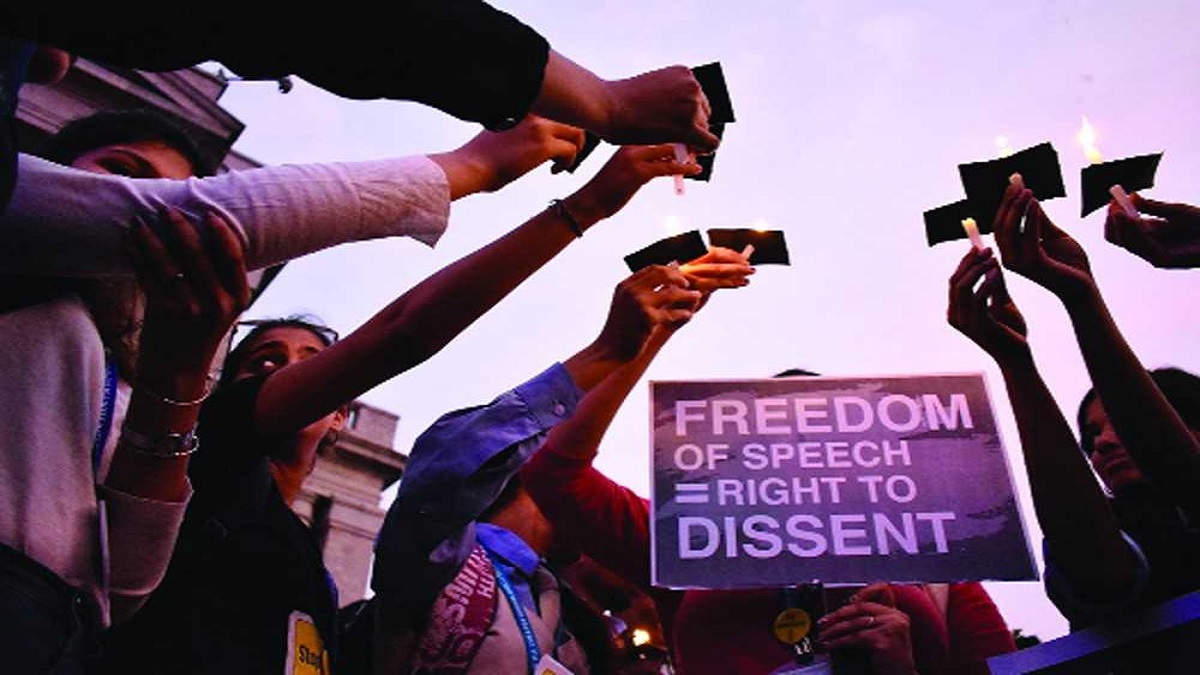Human rights activists and lawyers have claimed that in the last seven decades, invoking colonial-era laws such as IPC, criminal defamation, public nuisance etc. on protesters, activists, journalists remain high. They also claim that the purpose of invoking such laws is to curb dissent in society.
Human rights lawyer Lara Jesani told The Sunday Guardian that over the years, there has been increase in FIRs being filed under Section 332 and 353 of the Indian Penal Code (IPC). She said that the criminalization of dissenters has been on an unprecedented high in India in the past few years. Quoting from Ernest Hemingway’s book The Sun Also Rises, Vipul Mudgal, Director and Chief Executive of Common Cause, told The Sunday Guardian, “In the book, a character asks a tycoon ‘How did he go bankrupt’; the tycoon replied, ‘In two ways, first gradually and then suddenly’.
He further stated that the use of colonial laws against the dissenters has been there in India but it was gradual, only in some cases. However, since the past few years, there has been a sudden surge in the cases where individuals are implicated with such laws just to curb dissent in society.
Talking about the CrPC (Maharashtra Amendment) in 2018, Jesani, a Bombay High Court lawyer, told The Sunday Guardian, “In order to punish dissenter, the governments in succession have brought new laws or amended the existing laws. The successive governments, whether Central or in states, have ensured that dissenters are met with reprisal. However, in the last three to six years, the intensity and the ingenuity with which these laws are misused against protesters are unprecedented.”
In 2018, the Maharashtra government issued a gazette notification bringing into force the amendment to the Indian Penal Code and Code of Criminal Procedure (Maharashtra Amendment) Act, 2017. According to this amendment, assaulting the public servant will become cognizable and non-bailable and five-year imprisonment.
Raising questions on this, Jesani said, “These amendments were made stringent so that it could be used against the protestors and journalists for questioning the officials.” Citing an example of two journalists arrested under the IPC Sections 332 and 353, Jesani told The Sunday Guardian, “In 2019, two journalists—Husain Khan and Ram Parmar—were arrested under this colonial law after they had gone to the Palghar for reporting.”
Questioned about FIR details, Khan said, “In the FIR, it was said that we had obstructed the police officials from doing their duties and manhandled them.” According to a Status of Policing in India Report (SPIR) 2018, as many as 68% of people are fearful of being beaten up by police. According to the report, it was found that Punjab (46.7%) and Tamil Nadu (39.2%) are the states that are highly feared by police.
It must be noted that the Tamil Nadu police had come under severe criticism from the public for its police excesses against the father-son duo in June. Talking about it, Mudgal told The Sunday Guardian, “Police excesses are on the rise in India. This is because the police are following the orders of political masters and not serving the general public.”
“Nowadays, the partisan and differential treatment towards a particular community visible in the police. The Delhi riots are the perfect example of it. During the riots, the police inability to quell the violence was there for everybody to see. There has been a consistent decline in policing in the last decade,” claimed Mudgal.
He further stated that, according to the SPIR report, the police are not allowed to investigate a matter in an independent way. “When the police investigate cases, in 65% cases, there are either department pressure or political pressure. They are not allowed to investigate in a balanced way,” adding that the police have always been harsh and unkind to the vulnerable communities. Talking about the misuse of criminal defamation by the corporates, Jesani said that Sections 499 and 500 of the IPC are invoked against individuals and activists for raising a voice against violating the environment.
Citing an example, Jesani said, Rohit Prajapati, an environmentalist in Gujarat, had given a quote to a daily newspaper against violation of environmental norms by a particular company. Later, the company sued for criminal and civil defamation to Prajapati and the media house. She said, “This has been grossly misused by the corporates and entities in order to threaten and intimidate against those who raise their wrongdoings.” Though the Supreme Court upheld the constitutional validity of the colonial-era criminal defamation in 2016, Jesani and Mudgal are of the view the law should be repealed.
Mudgal told The Sunday Guardian, “Criminal defamation was taken from the British. It is high time the courts and Parliament repeal this. But if the Supreme Court has decided to uphold it, then the court must ensure that constitutional rights are safeguarded.” On questions about what reforms are needed in the police and law system, Mudgal said, “First, the governments should implement the Prakash Singh judgment where the transfer and posting will be decided by a committee headed by the chief ministers and the opposition leader will be part of the committee. This will enable a kind transparency and accountability in the policing system.”
“Second, we do not need heavily-militarised police, but better-equipped police in forensics and intelligence networks to resolve the cases. Law should be a living device, not a dead one,” he said.
Jesani said, “The police should be more sensitive towards the suspects and their rights. A precedent should be set where it is informed that the officials cannot let away by invoking a false case against an individual.” Mudgal said, “We do not need efficient police officials, but efficient and transparent officers.”

